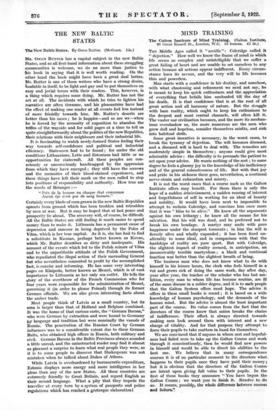THE NEW BALTIC STATES
The New Baltic States. By Owen Rutter. (Methuen. 15s.) Ma. Owrzf MaryEa has a capital subject in the new Baltic States, and as all first-hand information about these struggling communities is welcome, we do no more than justice to his book in saying that it is well worth reading. On the other hand the book might have been a great deal better. Mr. Rutter is one of those writers who have a strong desire, laudable in itself, to be light and gay and to put themselves on easy and jovial terms with their readers. This, however, is a thing which requires some doing. Mr. Rutter has not the art at all. The incidents with which he tries to lighten his narrative are often tiresome, and his pleasantries have had the effect of making one reader at all events feel less instead of more friendly towards him. Mr. Rutter's deserts are better than his oases ; he is happier—and so are we—when he is forced by the necessity of exposition to abandon the trifles of the wayside and for solid pages at a time to tell us quite straightforwardly about the politics of the new Republics, their relations with their neighbours and their industrial life.
It is fascinating to watch newly-formed States feeling their way towards self-confidence and political and industrial efficiency. Statesmen had to be found ; for under the old conditions Lithuanians, Letts and Estonians had little or no opportunities for statecraft. All these peoples are con- sciously or unconsciously handicapped by the oppression from which they have emerged ; they still have the sorrows and the memories of their blood-stained experiences, and these things have left their mark on the men called to step into positions of responsibility and authority. How true are the words of Beranger :— " Pres de la bourne on cheque etat commence Aucun epi n'est pur de sang humain."
Certainly every blade of corn grown in the new Baltic Republics sprouts from ground which has been trodden and retrodden by men at war. But it may be hoped that at last peace and prosperity lie ahead. The recovery will, of course, be difficult. All the Baltic States are still finding it much easier to spend money than to make it. Lithuania has a permanent cause of depression and rancour in being deprived by the Poles of Vilna, which is her true capital. As it is, she has had to find a substitute in Kaunas, perhaps better known as Kovno, which Mr. Rutter describes as dirty and inadequate. His account of the events which led to the Polish seizure of Vilna and to the unjustifiable attitude of the Polish Government, who repudiated the illegal action of their marauding General but who nevertheless consented to profit by the accomplished fact, is concise and informing. He has some very interesting pages on Klaipeda, better known as Memel, which is of vast importance to Lithuania as her only sea outlet. He tells the story of the overthrow of the French Commission who for four years were responsible for the administration of Memel, governing it (in order to please Poland) through its former German officials. We are also given interesting facts about the amber trade.
Most people think of Latvia as a small country, but its area is larger than that of Holland and Belgium combined. It was the home of that curious caste, the " German Barons," who were German by extraction and were bound to Germany by language and tradition but were nominally the vassals of Russia. The penetration of the Russian Court by German influences was to a considerable extent due to these German Balts, who obtained high offices in Russia, both military and civil. German Barons in the Baltic Provinces always sounded a little unreal, and the uninstructed reader may find it almost as pleasant a surprise to learn what real people they were, as it is to some people to discover that Shakespeare was not mistaken when he talked about Dukes of Athens.
While Latvia is overburdened by bureaucratic expenditure, Estonia displays more energy and more intelligence in her ideas than any of the new States. All these countries are extremely friendly to Great Britain, and regard English as their second language. What a pity that they impede the traveller at every turn by a system of passports and police regulations which has reached a grotesque elaboration!










































 Previous page
Previous page